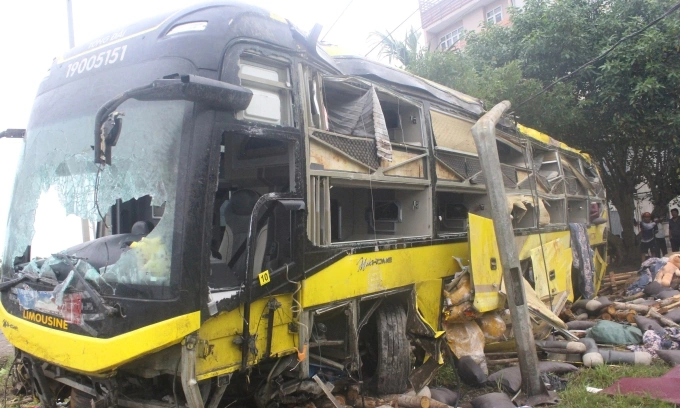
Although trucks and passenger buses make up less than 3% of the total registered road vehicles in Vietnam, they are involved in over 40% of traffic deaths, according to traffic police.
At a meeting with around 30 transportation business representatives on Friday in Hanoi, Major General Do Thanh Binh, head of the Traffic Police Department under the Ministry of Public Security, cited statistics showing that trucks and passenger buses account for only 2.49% of registered vehicles but are involved in 37.1% of accidents and 40.27% of traffic fatalities.
On average, one in every three accidents involves a truck, trailer, semi-trailer, or passenger bus.
In the first seven months of 2025, there were 4,000 traffic accidents nationwide involving trucks and passenger buses, resulting in 2,466 deaths and 2,106 injuries. The most recent incident was a sleeper bus overturn in central Ha Tinh Province that killed 10 people.
Major General Binh commented, "It’s very troubling. Even if you earn a million or a billion in assets, it means nothing if your vehicle is involved in a fatal accident," and questioned, "Can you sleep well knowing these statistics?"
Nguyen Cong Hung, Deputy General Director for Mai Linh Group’s northern region, noted that many accidents are treated as isolated cases without preventive action, leaving root causes unaddressed.
"Transport business is supposed to be a regulated industry, but anyone can get into it," he said. "Businesses are required to have a traffic safety monitoring department, but if an individual owns 2–3 vehicles, who monitors them? Who manages them?" he asked.
Agreeing, Phan Thanh Uy, Vice President of the Vietnam Automobile Transport Association, criticized the current transport business model and called for stricter regulations. "Only large transport companies invest in safety. If it’s just 1–2 vehicles, with the husband driving and the wife assisting, there’s no investment in safety equipment," he said.
Vu Duc Hoang, a representative from Hoang Long Bus Company, said sleeper buses are currently unsafe because many are converted from 45-seat coaches. To cut costs, most owners neglect installing auxiliary systems like electric retarders; some even remove them entirely due to their high cost. He suggested vehicles traveling over 200 km, especially on mountainous routes, should be required to install such braking systems.
Hoang also highlighted a lax driver testing system.
"We’ve discovered fake licenses among our drivers. Due to weak oversight, some drivers lack legal knowledge. Instead of blaming the drivers, we should ask where the system has failed," he said.
He also proposed banning passenger buses from operating between 2:30 a.m. and 5:30 a.m., when drivers are most likely to be drowsy.
Major General Binh concurred, sharing that in 2014 he contacted a major South Korean vehicle manufacturer and was told they never produced sleeper buses, as their high center of gravity and electrical system would require reengineering. Most sleeper buses are modified by secondary manufacturers.
Regarding the proposed early morning operating ban, General Binh said it is under consideration but requires further review due to multiple factors.
Delayed processing of traffic violations was another concern raised. A representative from GSM Taxi noted the company operates nearly 100,000 vehicles nationwide. In Hanoi alone, about 200 vehicles are affected by delayed fines, with thousands nationwide. Processing is difficult—when fines are issued, many drivers quit, and vehicle inspection requires the driver’s license. If the company cannot contact the driver, hundreds or thousands of vehicles may be grounded due to failed inspections.
Mai Linh Taxi also reported struggles with unresolved "cold fines" dating back two years. "Paying fines is a nightmare. Sometimes we have to visit the driver’s hometown to verify their identity," Hung said.
In response, the head of the Traffic Police Department said that moving forward, traffic violation notices will be issued within two hours, eliminating delays until vehicle inspections. The department has also proposed simplifying the penalty process to the Ministry of Justice, citing the current system’s excessive complexity with too many forms and procedures.
Komentar
Posting Komentar